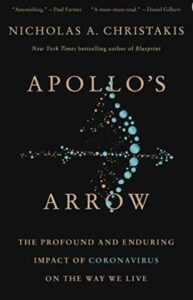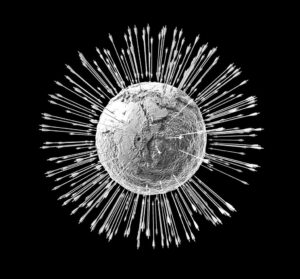Epidemic
Living with COVID as endemic.
April 28, 2021COVID is here to stay. With so many hesitant, and anti-vaxxers, it is now believed we will never reach herd immunity in this country.
What will the psychology and existential remains be as we settle into a new existence? -dayle
Dr. David Pate, Idaho COVID task force:
“I am very pleased with many of the efforts being made to address vaccine hesitancy, but we lost our chance a year ago to rid ourselves of this virus and unfortunately, I suspect we are unlikely to reach herd immunity given more and more evidence that prior infection is not going to be as protective as we had hoped, the unwillingness of people to follow guidance that would allow us to control disease transmission and therefore the evolution of variants, and the currently inadequate numbers of people willing to be vaccinated. Most likely, we just have to prepare for SARS-CoV-2 to be endemic.”
[Christakis is a physician and sociologist who explores the ancient origins and modern implications of human nature. He directs the Human Nature Lab at Yale University, where he is the Sterling Professor of Social and Natural Science in the department of sociology, medicine, ecology and evolutionary biology, statistics and date science and biomedical engineering.’]
‘…and frequent funeral piles of the dead were continually burning.’ -Homer, The Iliad
‘Humanity has but three great enemies: fever, famine, and war; of these by far the greatest, by far the most terrible, fever.’ Sir William Osler [1896]
New York Times
“The story changes daily and so do the prognostications about where this pandemic is going, how it will end (insofar as it ever does end), what toll it will take and whether it will serve as a critical inflection point, or not, for how we humans live on this planet. Will it deliver a deeply absorbed lesson, not just on disease preparedness but also on climate change and vanishing biological diversity, the three greatest problems we are facing and causing? Or will it drain away and be forgotten, as the 1918 influenza pandemic largely drained away, its lessons ignored and its grim particulars seemingly blocked from public memory for decades? Along with the prognostications we’re also getting postgnostications (it’s not my neologism), efforts to understand the past by predicting what happened: Where did this virus come from? A wild animal? Which animal? How did it manage to be so nefariously well adapted for human infection? How did it get into us at the start? Has it evolved since?
Given that Christakis is a physician and sociologist, the co-author of an earlier book about social networks and how they shape lives, the co-author also of an influential paper on “social contagion theory” and the co-director of the Institute for Network Science at Yale, one naturally expects that “network science” might afford him special insight into Covid-19.

